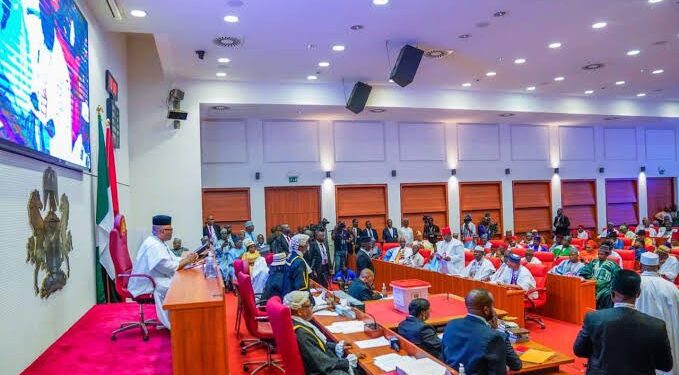Business
N2 trillion market loss: Senate urges Edun to review 30% Capital Gains Tax

The Senate has called on the Minister of Finance and Coordinating Minister of the Economy, Wale Edun, to urgently review the new 30 percent Capital Gains Tax (CGT) on large share sales, following a massive N2 trillion market loss that rocked the Nigerian Stock Exchange last week.
The tax hike, contained in the recently passed Nigerian Tax Act 2025, raises CGT on share disposals worth N150 million and above from 10 percent to 30 percent, with implementation scheduled to begin in January 2026.
Chairman of the Senate Committee on Capital Market and Institutions, Senator Osita Izunaso, made the appeal on Wednesday while presenting a paper titled “Redefining the Rules: The Investment and Securities Act 2025 and the Future of Nigeria’s Capital Market” at the Moneyline with Nancy Investment Forum 2025 held in Abuja.
Izunaso said the sudden adjustment in the tax regime has unsettled investors, leading to a wave of panic-driven share disposals that wiped out more than N2 trillion in market value within a week.
Izunaso commended President Bola Ahmed Tinubu for the renewed vibrancy in Nigeria’s capital market since 2023, attributing the progress to reforms that have stabilized the macroeconomic environment and improved policy coherence.
“However, there is something worrisome. The recent development under the Nigerian Tax Act 2025. The increase in Capital Gains Tax on share sales above N150 million is worrisome. This has created understandable concern among investors. In anticipation of this change, we have observed significant disposals by major investors, resulting in a notable decline in market capitalization over the past few days,” he said.
Senate to engage Finance Minister
According to him, the market lost over N2 trillion within a week due to panic-driven transactions, adding that while taxation is vital for national revenue, fiscal policies must be designed to avoid eroding investor confidence or discouraging long-term investment.
“While taxation is essential for revenue generation, it is equally critical that fiscal measures do not inadvertently undermine investors’ confidence or discourage long-term capital formation.
“The Senate Committee on Capital Market will be engaging the Honourable Minister of Finance to suggest to the minister to explore a mechanism to address this concern, ensuring that both domestic and foreign investors remain engaged and confident in the Nigerian market,” he noted.
He suggested that the Finance Minister exercise discretion in implementing certain aspects of the new tax law, particularly those with far-reaching implications on capital formation and market stability.
“We are aware that the new law is supposed to commence by January 2026. But we are suggesting that there are some provisions of that Act that require the commencement to begin only when the Honourable Minister of Finance advises the Executive. I think this is one of those things that should not commence on January 1, because it is already affecting the market,” he explained.(Nairametrics)
-

 Opinion18 hours ago
Opinion18 hours agoLeft behind but not forgotten
-

 Politics18 hours ago
Politics18 hours agoWe Don’t Need Gov’s Support To Deliver Rivers For Tinubu – Wike
-

 News18 hours ago
News18 hours agoTinubu’s ambassador-designates in limbo
-

 Business18 hours ago
Business18 hours agoCBN raises alarm over Nigeria fintech’s foreign reliance
-

 Politics18 hours ago
Politics18 hours agoWe’ve no plans to impeach dep gov — Kano Assembly
-

 Politics18 hours ago
Politics18 hours agoElectoral Act: Amendment yet to be concluded – Akpabio tells critics
-

 News18 hours ago
News18 hours agoKaduna Residents Protest Displacement Of 18 Villages By Bandits, Closure Of 13 Basic Schools
-

 News17 hours ago
News17 hours agoN7 Trillion, Four Presidents, Nigeria Still In Darkness


















